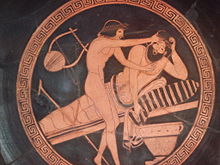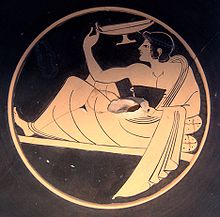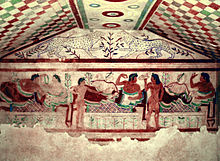- Symposium
-
- This article is about the social custom in ancient Greece. For other uses, see Symposium (disambiguation).
 A female aulos-player entertains men at a symposium on this Attic red-figure bell-krater, ca. 420 BC
A female aulos-player entertains men at a symposium on this Attic red-figure bell-krater, ca. 420 BC
In ancient Greece, the symposium (Greek συμπόσιον symposion, from συμπίνειν sympinein, "to drink together") was a drinking party. Literary works that describe or take place at a symposium include two Socratic dialogues, Plato's Symposium and Xenophon's Symposium, as well as a number of Greek poems such as the elegies of Theognis of Megara. Symposia are depicted in Greek and Etruscan art that shows similar scenes. The equivalent in Roman society is the Latin convivium.[1]
Contents
Setting and social occasion
The Greek symposium was a key Hellenic social institution. It was a forum for men of good family to debate, plot, boast, or simply to revel with others. They were also frequently held to celebrate the introduction of young men into aristocratic society. Symposia were also held by aristocrats to celebrate other special occasions, such as victories in athletic and poetic contests.
Symposia were usually held in the andrōn (ἀνδρών), the men's quarters of the household. The participants, or "symposiasts," would recline on pillowed couches arrayed against the three walls of the room away from the door. Due to space limitations the couches would number between seven and nine, limiting the total number of participants to somewhere between fourteen and twenty seven[2] (Oswyn Murray gives a figure of between seven and fifteen couches and reckons fourteen to thirty participants a "standard size for a drinking group").[3] If any young men took part they did not recline but sat up.[4]
Food and wine were served. Entertainment was provided, and depending on the occasion could include games, songs, flute-girls or boys, slaves performing various acts, and hired entertainment.
Symposia often were held for specific occasions. The most famous symposium of all, described in Plato's dialogue of that name (and rather differently in Xenophon's) was hosted by the poet Agathon on the occasion of his first victory at the theater contest of the 416 BC Dionysia. According to Plato's account, the celebration was upstaged by the unexpected entrance of the toast of the town, the young Alcibiades, dropping in drunken and nearly naked, having just left another symposium.
The men apart of the symposium would discuss a multitude of topics--from philosophy to the differences between gender and love.
Drinking
A symposium would be overseen by a "symposiarch" who would decide how strong the wine for the evening would be, depending on whether serious discussions or merely sensual indulgence were in the offing. The Greeks and Romans customarily served their wine mixed with water, as the drinking of pure wine was considered a habit of uncivilized peoples. The wine was drawn from a krater, a large jar designed to be carried by two men, and served from pitchers (oenochoe). Certain formalities were observed, most important among which were libations, the pouring of a small amount of wine in honour of various deities or the mourned dead.
In a fragment from his circa 375 BC play Semele or Dionysus Eubulus has the god of wine Dionysos describe proper and improper drinking:
For sensible men I prepare only three kraters: one for health (which they drink first), the second for love and pleasure, and the third for sleep. After the third one is drained, wise men go home. The fourth krater is not mine any more - it belongs to bad behaviour; the fifth is for shouting; the sixth is for rudeness and insults; the seventh is for fights; the eighth is for breaking the furniture; the ninth is for depression; the tenth is for madness and unconsciousness.
In keeping with the Greek virtue of moderation, the symposiarch should have prevented festivities from getting out of hand, but Greek literature and art often indicate that the third-krater limit was not observed.
Entertainments
Poetry and music were central to the pleasures of the symposium. Although free women of status did not attend symposia, female prostitutes (hetairai) and entertainers were hired to perform, consort, and converse with the guests. Among the instruments women might play was the aulos, a Greek woodwind instrument sometimes compared to an oboe. When string instruments were played, the barbiton was the traditional instrument.[5] Slaves and boys also provided service and entertainment.
The guests also participated actively in competitive entertainments. A game sometimes played at symposia was kottabos, in which players swirled the dregs of their wine in a kylix, a platter-like stemmed drinking vessel, and flung them at a target. Another feature of the symposia were skolia, drinking songs of a patriotic or bawdy nature, performed competitively with one symposiast reciting the first part of a song and another expected to improvise the end of it. Symposiasts might also compete in rhetorical contests, for which reason the word "symposium" has come to refer in English to any event where multiple speeches are made.
Etruscan and Roman drinking parties
Etruscan art shows scenes of banqueting that recall aspects of the Greek symposia; however, one major difference is that women of status participated more fully in this as in other realms of Etruscan society.
As with many other Greek customs, the aesthetic framework of the symposium was adopted by the Romans under the name of comissatio. These revels also involved the drinking of assigned quantities of wine, and the oversight of a master of the ceremonies appointed for the occasion from among the guests. Another Roman version of the symposium was the convivium.
Notes
- ^ Peter Garnsey, Food and Society in Classical Antiquity (Cambridge University Press, 1999), p. 136 online; Sara Elise Phang, Roman Military Service: Ideologies of Discipline in the Late Republic and Early Principate (Cambridge University Press, 2008), pp. 263–264.
- ^ Literature in the Greek World By Oliver Taplin; p47
- ^ The Oxford Companion to Classical Civilization (ed. Hornblower & Spawforth), pp.696-7
- ^ Xenophon, "Symposium" 1.8
- ^ Bryn Mawr Classical Review 2004.09.16 of Alessandro Iannucci, La Parola e l'Azione: I Frammenti Simposiali di Crizia. Bologna: Edizioni Nautilus, 2002 [1]
External links
- Ancient Greek art depicting symposium scenes
- A kylix with symposium scene
- Metropolitan Museum
 The Wiktionary definition of symposium
The Wiktionary definition of symposium Chisholm, Hugh, ed (1911). "Symposium". Encyclopædia Britannica (11th ed.). Cambridge University Press.
Chisholm, Hugh, ed (1911). "Symposium". Encyclopædia Britannica (11th ed.). Cambridge University Press.
Pottery of ancient Greece Wine shapes Perfume shapes and wedding shapes Funerary shapes and cultic shapes Storage shapes Techniques Painters Special topics in Greek pottery Typology · Kalos inscription · Symposium · Corpus Vasorum Antiquorum · John Beazley · Panathenaic Amphorae · South ItalianCategories:- Parties
- History of wine
- Ancient Greek society
- Ancient Greek culture
- Ancient Greek and Roman leisure
Wikimedia Foundation. 2010.





